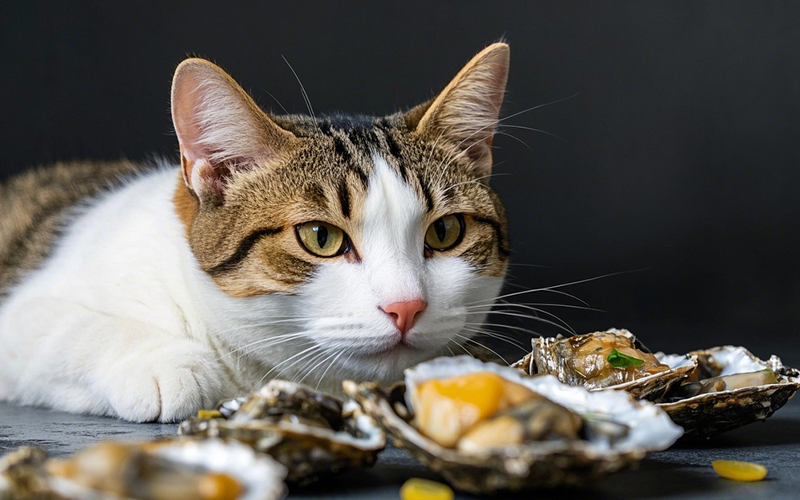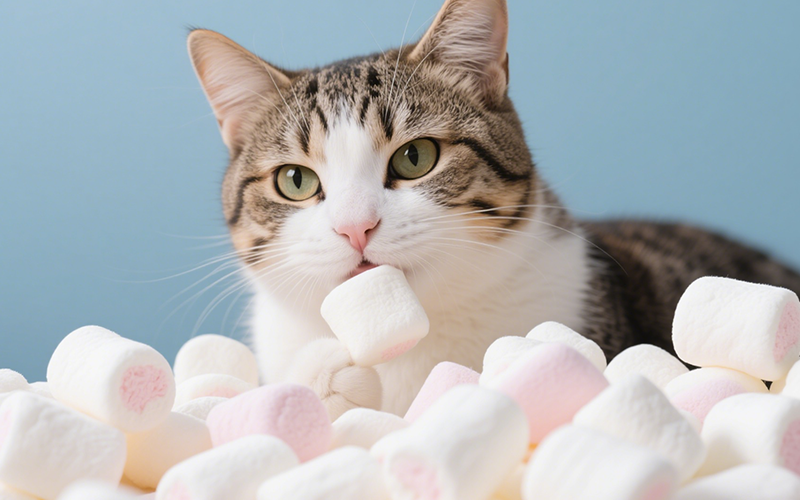Can Cats Eat Oysters? A Guide to Feeding Your Feline Shellfish
- 24 Mar 2025 14:24
Oysters are a delicious delicacy for humans, often enjoyed raw, cooked, or in various dishes. But when it comes to can cats eat oysters, it’s important to tread carefully. Oysters are not toxic to cats, but there are a few things to keep in mind if you're considering offering them to your feline friend. Let’s explore whether oysters are a safe treat for cats and how to feed them properly if you choose to do so. 🦪🐱

Are Oysters Safe for Cats to Eat?
Yes, cats can eat oysters in moderation, but there are some important considerations to keep in mind:
Nutritional Benefits: Oysters are packed with protein, omega-3 fatty acids, and minerals like iron and zinc, which are good for cats in small amounts. These nutrients can support your cat’s overall health, especially their immune system and coat condition. 🐟✨
Rich in Zinc: Oysters are rich in zinc, which is an essential mineral for cats. While too much zinc can be toxic, a small amount of oyster is unlikely to cause harm and may actually help your cat’s immune function. However, always be cautious with portion size. ⚖️
Low in Carbs: Oysters are low in carbohydrates, which aligns well with your cat’s carnivorous diet. They are mostly composed of protein and fats, making them a better option than grains or processed foods. 🐾
Risks of Feeding Oysters to Cats
While oysters offer some nutritional value, there are also risks involved, especially if they're not served properly:
Raw Oysters: The biggest concern when feeding oysters to cats is the risk of bacteria or parasites, especially when they’re raw. Vibrio bacteria and norovirus can be present in raw oysters and pose health risks for both cats and humans. Cooking oysters can eliminate this risk, so it’s best to always serve cooked oysters to your cat. 🦠
Shells: The shells of oysters can pose a choking hazard or cause injuries to your cat’s digestive system. Never offer your cat whole oysters with the shell still on. Make sure to remove the shell completely before feeding them any oyster meat. 🐚⚠️
Allergies or Sensitivities: Some cats may have food allergies or sensitivities to shellfish, which can cause digestive upset, including vomiting, diarrhea, or bloating. Always monitor your cat after introducing a new food like oysters and stop if you notice any negative reactions. ⚡
High Sodium Content: Oysters can be high in sodium (salt), especially if they are served in a brine or preserved. Too much salt can be harmful to cats and may lead to dehydration, kidney problems, or high blood pressure. Always opt for fresh oysters that haven’t been processed with added salt. 🧂
How to Safely Offer Oysters to Your Cat
If you decide to give your cat oysters, here’s how to do so safely:
Cook the Oysters: Always cook oysters thoroughly to eliminate harmful bacteria or parasites. Steaming or boiling is a good option. Avoid frying or using oils, as fats can upset your cat’s stomach. 🍲
Remove the Shell: Be sure to remove the shell completely before serving the oyster meat to your cat. The shell can be a choking hazard or cause digestive blockages. 🐚
Serve in Small Portions: Oysters should be treated as an occasional treat, not a regular part of your cat’s diet. Offer small portions to ensure they don’t overwhelm your cat’s digestive system or cause any adverse reactions. 🥄
Monitor for Reactions: After feeding your cat oysters, keep an eye out for any signs of digestive discomfort. If your cat starts showing signs of vomiting, diarrhea, or excessive drooling, stop feeding them oysters and consult a professional. 👀
Healthier Alternatives to Oysters for Cats
If you're looking for safer or more nutritious alternatives to oysters, consider these options:
Cooked Fish: Fish like salmon, tuna, or sardines are safe and nutritious for cats in small portions. They offer similar health benefits without the risks of shellfish. 🐟
Chicken or Turkey: Cooked chicken or turkey is a great source of protein and essential nutrients that support your cat’s health. These meats are safe and well-suited for your feline friend. 🍗
Eggs: Scrambled or boiled eggs are a protein-packed treat and a healthier option than shellfish. They’re easy to digest and a great source of amino acids. 🍳
Canned Cat Food: If you're looking for a convenient and balanced meal, high-quality canned cat food often contains fish or meat-based protein that your cat will love. 🐾
How PettureX Can Help with Your Cat’s Diet
If you’re ever unsure about what foods are safe for your cat or need more personalized advice, PettureX is here to assist. With 24-hour online consultations and pet image recognition technology, PettureX can guide you in making the best dietary choices for your cat’s health. 📱🐾
Conclusion
Can cats eat oysters? Yes, but only in moderation and under safe conditions. Oysters can provide some health benefits for your cat, including protein and omega-3 fatty acids, but they should always be cooked and served without the shell. Keep portion sizes small, and avoid raw oysters to reduce the risk of bacteria or parasites.
For any doubts or to get expert guidance on what’s safe for your cat to eat, PettureX is available to help! 🌟🐱
Have you ever given your cat oysters or shellfish? How did they react? 😺
Related

Marshmallows and Cats: A Puffy Problem? Why Vets Say No to This Sugary Snack
- 22 Apr 2025
Kefir for Kitties? A Veterinarian-Reviewed Guide to Safety, Benefits & Risks
- 22 Apr 2025
The Burning Question: Can Cats Eat Jalapenos? A Comprehensive Safety Guide
- 21 Apr 2025
Cool Temptation: Can Cats Eat Ice Cream Safely? The Vet-Backed Truth
- 21 Apr 2025
Frankly Dangerous: Can Cats Eat Hot Dogs? Vet Explains the Serious Risks
- 16 Apr 2025
A Purrfect Protein? Can Cats Eat Ground Turkey Safely? (Vet-Reviewed Guide)
- 16 Apr 2025
Gritty Situation: Can Cats Eat Grits Safely? Vet Explains the Risks
- 16 Apr 2025
Gravy Danger Zone: Can Cats Eat Gravy Safely? (Vet-Reviewed Warning)
- 16 Apr 2025
Crunchy Query: Can Cats Eat Green Peppers? A Vet-Reviewed Safety Analysis
- 16 Apr 2025
Toxic Temptation: Can Cats Eat Grapefruit? Vet Explains the Dangers
- 16 Apr 2025
